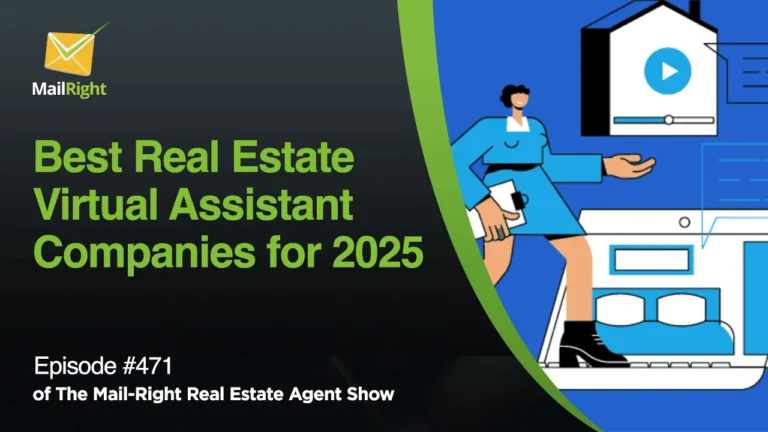Is traditional branding still relevant? For the 383rd episode of Mail Right Show, Robert Newnan and Jonathan Denwood explore the traditional and digital branding in the real estate industry, delving into the challenges and strategies it presents in today’s market. For the past ten years, Robert Newman has been working in the real estate SEO industry as a CEO at Inbound REM, an inbound marketing firm. On the other hand, Jonathan Denwood is the founder and CEO of Mail Right, a platform that integrates multiple digital tools into a single, convenient, and user-friendly package. This episode highlights the differences between traditional and digital marketing, what consumers want from real estate agents, and effective strategies to stay ahead of the competition.
What Traditional Real Estate Marketing Used To Look Like
When realtors start talking about branding, they talk about a traditional brand identity package, which are letterhead, business cards, throwing a sign on your car license plate, things that barely even move the needle in the digital age, and things that are almost practically irrelevant and were almost entirely unrelated during the pandemic.
One of the traditional real estate marketing that worked before is Geographic Farming, where one will spend five or six years building up a reputation with the audience that you’re sending postcards to; however, there’s no trackability, and you don’t know if you’re getting a visit, a call, or somebody’s looked at your card a hundred times or throwing away a hundred times. You also don’t know if you are establishing your brand, which is perhaps why it’s considered one of the least popular types of marketing. Some advertise in theaters or opera and in the back of magazines, where some think high net-worth individuals spend their time.
Digital Real Estate Marketing Used To Look Like
Before, professionals used to print and distribute physical business cards. However, in today’s digital era, most individuals opt for digital business cards, typically made of metal that can be tapped against a phone, instantly transferring the user’s information to the recipient’s contact list.
One of the advantages of digital marketing is that it is trackable. If you spend $1,000 online, you can see that. If you want to check whether you leave an impression, you can track it despite not getting a call. This is also one of the reasons why traditional real estate marketing is slowly dying as a newer generation takes up the mantle. Many individuals today acknowledge that marketing in the dark is somewhat challenging to quantify their dollars spent. They don’t know if the efforts are working for them or not.
Personal Brand Through Social Proof
A day doesn’t go by where a realtor doesn’t call in and talk about branding. What people believe branding to be and what it actually is are different. These days branding is much more about informational intelligence. Knowledge is the new branding. In other words, how can someone prove their expertise in a specific business category they say they are good at? How will you prove that you know what you’re talking about?
One thing that has changed today is when people decide when buying is, they check out reviews. In modern real estate marketing, social proof- reviews, what people say about you, past clients say, and sold homes- is more important than word of mouth, buzz, or visually based branding elements. Say someone will spend more than $100-200 on something, and they are looking at a local service provider, whether a mechanic or a restaurant, or whatever they sign up for; they will read reviews. Say you have bad reviews; some can be reasonable for sane people, but if the bad reviews are consistent, it will influence the buyer’s decision.
When someone talks to realtors who buy and sell real estate, they usually visit the About page, where realtors put their social proof. Furthermore, when talking about a realtor doing many businesses out of a specific neighborhood or building, realtors ensure to get the sold home data shown on the web page and demonstrate their expertise. And it makes a huge difference in the page’s performance and registrations. So, social proof is more important than what most people used to acknowledge as branding.
Utilize Video to Demonstrate that You Know What You Are Talking About
Put a video on a web page, and start talking about what you’re good at doing, which will come across as more authoritative than a newspaper article that somebody else has written about you. It is not that a newspaper article somebody has written about you is a bad way to advertise yourself, it is a good way to advertise yourself, but it isn’t necessarily going to get you the same amount of calls that it used to. Instead of advertising yourself that way, you can send somebody to a website, Google My Business page, or Zillow profile and open up somebody’s mind to the idea that they will research you. This way, people can read your bio, reviews about you, and your past sales, which gives a high possibility of calling you. Remember that, doing more pre-research and pre-qualifying the vendor they will approach is part of the buyer’s journey.
The Mission is Critical
Say you have a pipeline of ways to drive people to review, and you are ranking organically or driving them into paid advertising. But these readers have friends or family that do the same business you are doing, and a sense of courtesy and responsibility drives their intentions. Say they are ready to spend about $10,000 or $12,000; they recognize the importance of thoroughly exploring their options to ensure they engage the services of a competent professional. They acknowledge the positive feedback by assessing the reviews while noting that the pricing appears slightly higher than expected yet comparable to their relative’s charges. In such a scenario, the familiar acquaintance would still be favored for the transaction. However, a potential strategy exists to tilt the scales in your favor.
That is your mission, who you are as a human being, and what you believe in. If you think this is the only thing that will make you sell 100 homes, absolutely not. But what sets you apart or distinguishes you from the rest is crucial in a competitive market with numerous people engaged in similar business, including many skilled professionals. This scenario is prevalent in the luxury sector and, to a certain extent, in the upper-middle-class space. Have a distinct mission or something that resonates with the target audience, something unique factor that has the potential to make a difference truly.





